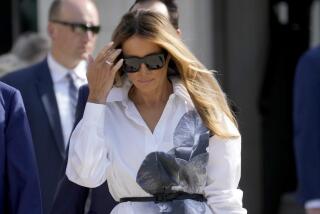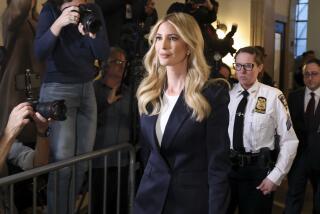Lewinsky’s Mother Too Upset to Testify
WASHINGTON — Marcia Lewis was judged too emotionally unsettled to resume testifying before the federal grand jury on Thursday, but her daughter, Monica S. Lewinsky, flew back to Washington as the investigation of President Clinton’s relationship with his former intern and the possible obstruction of justice moved toward a potentially critical turning point.
Lewinsky, who received a police escort to Los Angeles International Airport and was driven directly onto the tarmac in a black limousine, remains under subpoena to testify before the grand jury. And her mother could resume testifying as early as Tuesday.
“As a result of yesterday’s proceedings, which were very overwhelming and emotionally draining, she was unable to proceed again today,” said Lewis’ lawyer, Billy Martin. But, he added, “she remains under subpoena, and she will continue when a new date is set.”
In purely legal terms, Lewis is a central figure in the case as a confidant and active advisor to her daughter at important junctures. What she does or does not say to the grand jury sets the stage--and becomes the benchmark--for what could be the climactic appearance by her daughter. And Lewinsky’s testimony, in turn, could be decisive for both Clinton and independent counsel Kenneth W. Starr.
*
Beyond Lewis’ legal significance, however, in terms of the unfolding public drama that has become increasingly important to the outcome of the case, Lewis’ protracted struggle with the grand jury has become a potentially thorny problem for Starr.
The image of an ashen-faced mother being questioned under oath about her own daughter has touched a nerve with the public, and lawyers for both Lewis and Lewinsky have worked to heighten the picture of parent and child caught in the merciless toils of the criminal justice system.
“They have a lot of love between them. Right now, at a time when they could probably use each other’s support, these proceedings cause them to be drawn further apart,” Martin declared in his statement announcing that Lewis was excused from a third straight day of testimony.
And in Los Angeles, William Ginsburg, one of Lewinsky’s lawyers, said that while calling the mother and daughter before a grand jury might be standard prosecutorial tactics, “it’s not nice. It’s ugly. And all Americans should take note of how far they are going.”
“Her mother needs her right now,” said Ginsburg. “This is a family thing.”
As great as the political risks of pursuing her may be for Starr, Lewis occupies a unique position in the still-murky case.
She appears to be the one person involved at every stage of the events in question: Her daughter apparently talked candidly to her from the beginning of whatever relationship existed between Lewinsky and Clinton. Evidence suggests Lewis may have offered suggestions and advice on how to avoid exposing the relationship when lawyers in the Paula Corbin Jones sexual-harassment lawsuit began zeroing in on it--advice that could amount to obstructing justice.
And it was Lewis who came to Washington from her home in New York to get her daughter a lawyer and block efforts by Starr’s investigators to enlist Lewinsky’s cooperation in trying to bait a trap for the president.
Though she spent two grueling days before the grand jury Tuesday and Wednesday, it is not known what, if anything, Lewis has actually revealed in the closed-door proceedings.
“I can’t imagine she has three days’ worth of testimony,” Victoria Toensing, a former Justice Department official and prosecutor and now a defense attorney here, said of Lewis’ unexpectedly long time before the panel. “It could mean that every question she’s being asked she is going outside to consult with her attorney,” who is not allowed inside the grand jury room. Sources familiar with the case say she did indeed consult repeatedly with Martin.
“This could be because she’s truly not comfortable” about answering questions, Toensing said, “or it could be part of a strategy to make the testimony take longer because then it appears she’s being mistreated.”
“It’s not unusual to call a mother for testimony, but it’s rare for a mother and a child to be involved in the same subject under investigation,” she added.
In other developments:
* Atty. Gen. Janet Reno told reporters the Justice Department is reviewing the question of whether the government should resist subpoenas to members of the Secret Service. She declined to state who is taking part in the review or otherwise elaborate on how it is being handled.
When asked whether her pledge to give prosecutors complete independence in their investigation into the Lewinsky matter could complicate the decision on the Secret Service issue, Reno replied: “I never measure things by difficulty. I just take the issue and address it . . . based on the evidence and the law.”
* Retired Secret Service officer Lewis Fox of Waynesburg, Pa., appeared briefly at the federal courthouse, but it was not known whether he testified before the grand jury. Fox has said in press interviews that he remembers Lewinsky’s coming to the Oval Office several times with papers for the president and spending time with him there.
Clinton is understood to have said in a deposition in the Jones case that he does not recall meeting alone with Lewinsky, except possibly for brief periods when she brought documents to his office.
* A uniformed Secret Service agent still on active duty was subpoenaed to testify before the grand jury, but a senior government official said the current agent “says he doesn’t know what it’s all about and has no information about any woman and the president.”
The official speculated that since the agent was assigned to the Secret Service control room, Starr might have subpoenaed him to testify about Fox’s assignment to Oval Office duty.
The official also pointed out that a Secret Service agent is always stationed outside the Oval Office windows when the president is in his office. The agent would be able to view any activity inside the Oval Office, the official said.
Meanwhile, Justice and Treasury officials are still resisting the subpoena of the agent but are meeting with Starr’s attorneys over the issue.
More to Read
Sign up for Essential California
The most important California stories and recommendations in your inbox every morning.
You may occasionally receive promotional content from the Los Angeles Times.











